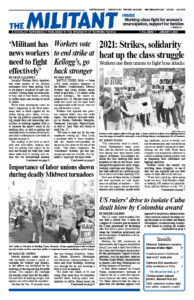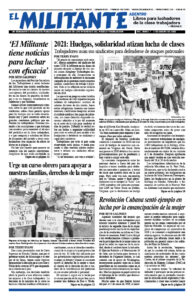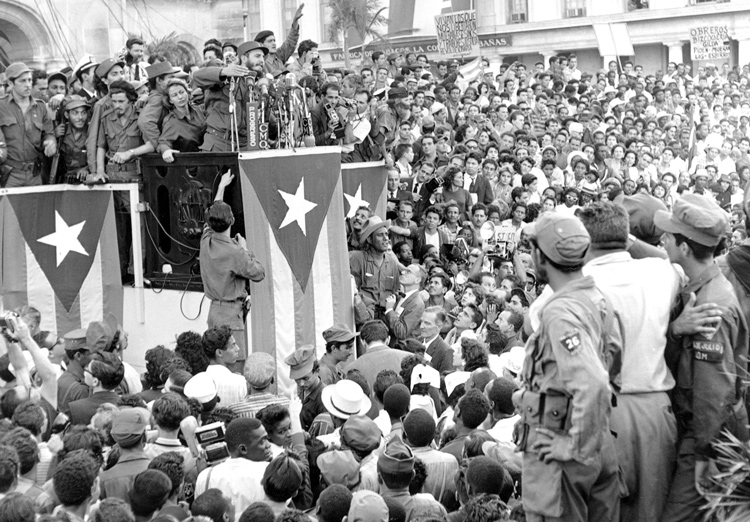Below are excerpts from a speech given by Fidel Castro in Havana, Jan. 1, 1979, celebrating the 20th anniversary of the defeat of the U.S.-backed Fulgencio Batista dictatorship and the opening of the first socialist revolution in the Americas. Castro describes the momentous events that placed power in the hands of the workers and farmers. Today, on its 63rd anniversary, Cuba’s revolution stands as an example for working people everywhere to emulate. The entire talk appears in Education for Socialists: Selected Speeches of Fidel Castro. Copyright ©1979 by Pathfinder Press. Reprinted by permission.
Perhaps not even we ourselves were fully aware of how great a step January 1, 1959, was to be in the history of our homeland and of the Americas — that January 1 that was also a tremendous event in the development of the world revolutionary movement.
Forty-one years and two months after the glorious October Revolution [in Russia], the first socialist revolution in the western hemisphere began. Four and a half centuries after the discovery of America, a society that was the fruit of that conquest; of the extermination of the aboriginal population; and of colonization, slavery, capitalism, neocolonialism and imperialism was to know its first truly deep and irreversible change. This change took place at the very doors of the most powerful imperialist country in the world. …
Cuba was, without a doubt, after Puerto Rico, the nation most tied to U.S. domination in the Americas. The large landowners and bourgeoisie, trusting to the power of the empire and to the well-armed and well-trained repressive forces, never thought seriously about the possibility of a socialist revolution in our homeland. …
The people needed leaders. The leaders were among the people. The people always produced its leaders in every stage of our revolutionary struggles. Leaders do not shape peoples; it is the peoples that shape their leaders.
None of the men who later were to lead the victorious ranks of the Rebel Army on January 1, 1959, had gone to a military academy or had ever been lionized by the press. And, with but few exceptions, none of the ones who later were to figure in the Political Bureau and the Central Committee of the Party or in the leadership of the Government were known then.
The bourgeois press, the bourgeois parties and imperialism had hammered out other names, other figures, other leaders. Today, millions of our young people and children have never even heard of them, and many of our adults have forgotten them.
But we had to fight. I repeat that there is no revolution without a struggle. No social changes are possible without the tenacious, consistent struggle of the peoples and their revolutionary vanguard. Marxism-Leninism gives us theory; the struggle gives us victory. …
In Cuba, it may be categorically stated that revolutionary power was won exclusively by our people. At that stage we couldn’t receive any kind of foreign aid, and the arms with which we fought were supplied exclusively to the Batista army, from which we took them in one battle after another.
It is impossible to forget the days that led up to January 1, 1959. Hard fighting was going on all over the country. While the underground fighters in the cities risked their lives, defying death with incomparable courage up to the very last, the Rebel Army, with 3,000 veterans … fought tirelessly and inflicted one defeat after another on an adversary whose total forces ran to 80,000 men. Alongside the revolutionary army marched all the people.
That was an unforgettable, history-making day that we are celebrating today, one on which our workers unanimously went over the heads of their official “leaders” and carried out the Rebel Army’s instructions to take a decisive part in the battle, throwing themselves into the general strike that paralyzed the country completely, helped to destroy imperialism’s coup maneuver and facilitated controlling and disarming the rest of the enemy units in less than 72 hours. All the people took part in the final battle — a beautiful and exemplary revolutionary event that changed forever the history of our homeland. …
Up until January 1, imperialism was our indirect adversary; our direct adversary was Batista. After January, imperialism was our adversary directly. Before January, we fought to become the masters of our destiny; after January, we fought to defend this right and to carry out the socialist revolution.
Before January, we waged a patriotic battle; after January, our battle was also internationalist. (Applause)
Before January, we were part of a national revolution; since that January, we have been part of the world revolution. (Applause) Before January, a vanguard was the main protagonist in events; since that January, the main protagonist has been the people. (Applause)


